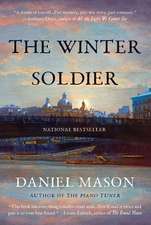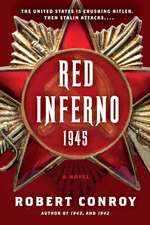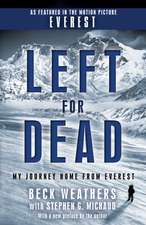1942
Autor Robert Conroyen Limba Engleză Paperback – 31 ian 2009 – vârsta de la 14 până la 18 ani
The Japanese surprise attack on Pearl Harbor was a resounding success–except for one detail: a second bombing mission, to destroy crucial oil storage facilities, was aborted that day. Now, in this gripping and stunning work of alternate history, Robert Conroy reimagines December 7, 1941, to include the attack the Japanese didn’t launch, and what follows is a thrilling tale of war, resistance, sacrifice, and courage. For when Admiral Isoroku Yamamoto sees how badly the United States has been ravaged in a two-pronged strike, he devises another, more daring proposal: an all-out invasion of Hawaii to put a stranglehold on the American Pacific Fleet.
Yamamoto’s strategy works brilliantly–at first. But a handful of American soldiers and a determined civilian resistance fight back in the face of cruelty unknown in Western warfare. Stateside, a counterassault is planned–and the pioneering MIT-trained aviator Colonel Jimmy Doolittle is given a near-impossible mission with a fleet of seaplanes jury-rigged into bombers. From spies to ordinary heroes and those caught between two cultures at war, this is the epic saga of the Battle of Hawaii–the way it very nearly was. . . .
Preț: 109.32 lei
Nou
Puncte Express: 164
Preț estimativ în valută:
20.92€ • 22.72$ • 17.57£
20.92€ • 22.72$ • 17.57£
Carte disponibilă
Livrare economică 01-15 aprilie
Preluare comenzi: 021 569.72.76
Specificații
ISBN-13: 9780345506078
ISBN-10: 0345506073
Pagini: 368
Dimensiuni: 142 x 211 x 22 mm
Greutate: 0.29 kg
Ediția:New.
Editura: BALLANTINE BOOKS
ISBN-10: 0345506073
Pagini: 368
Dimensiuni: 142 x 211 x 22 mm
Greutate: 0.29 kg
Ediția:New.
Editura: BALLANTINE BOOKS
Extras
Chapter 1
The day threatened to be pleasantly uneventful for U.S. Army Captain Jake Novacek as he dressed and got ready for another Sunday in paradise. After a hard week’s work, he thought he might go to Waikiki, lie in the sun, and stare at the attractive young women in their bathing suits.
His only concern was that he still ached from Saturday’s Army-Navy touch football game with other officers. They were ex-athletes like himself, but unfortunately, they were several years younger than Jake’s thirty-six and had nearly run him into the ground. Jake was larger than most at just under six feet and almost two hundred pounds, which somewhat compensated for the age disparity when he managed to catch up with one of the young navy pups. It may have been touch football, but some of the touches were damned hard.
Jake grimaced from a stiffness in his shoulder as he finished shaving. He was in his overnight quarters at Hickam Field’s officers’ club instead of the small apartment he had in Honolulu, and admitted he had no one but himself to blame for the situation. But then he grinned. Touch football or not, it was fun to knock a sailor-boy officer on his ass every now and then. He checked his thick black mustache—which pushed the limits permitted by the army—and trimmed a couple of errant hairs.
Jake had just put on his trousers and was deciding whether to eat breakfast in town or at the officers’ club when he thought he heard thunder. At first, he ignored it, but it was sunny out; why the thunder?
As he pondered this, the sounds got closer. “Oh, shit,” he muttered. Somebody was going to get in a whole lot of trouble for scheduling gunnery practice on a Sunday morning in December.
Then he was on the floor and gasping for breath while his ears rang from the shock of an explosion. His small room was full of dust, and something cut his arm.
Jake got up and ran down the stairs and outside, where other officers were gathering, shock and disbelief on their faces.
“What the hell’s going on?” Jake yelled, and no one answered. Had some asshole dropped a bomb or plunked a shell down on the wrong spot? He felt a twinge of sorrow for the poor bastard. Then a plane flew overhead, and he saw the rising sun on its wing.
“Japs!” someone yelled. “We’re being attacked by the Japs!”
Another bomb landed nearby, and he felt the concussion. Jake ran in the general direction of the airfield, dreading what he would see when he got there. He knew that the planes on the ground were vulnerable. Nobody was prepared for an attack.
He arrived just in time to see a Jap plane peeling off from a strafing run. It passed over his head by no more than a hundred feet, and he saw the pilot’s face. It looked like the monkey-faced bastard was grinning.
Jake wrenched his eyes back to the runways, where so many planes had been parked nearly wingtip to wingtip in anticipation of a saboteur’s attempt to sabotage them, which General Short feared in these tense times. Jake had said it was a bad idea, and now, as he watched them burn and explode by the dozens, he knew he had been vindicated and hated the fact.
Across the runway, a pair of 37 mm antiaircraft guns pointed uselessly at the sky while their crews watched the destruction. Angered, he ran across the field to the guns, dropping to the ground when another Jap plane streaked overhead. He comforted himself with the thought that a single man foolish enough to dash across a runway wasn’t much of a target for a Jap in an airplane.
He reached the guns, where a sergeant saluted him quickly. “Sergeant, who are you and why the hell aren’t you shooting at them?” Jake yelled, his voice shaking in anger.
The sergeant shrugged in utter disgust. “I’m Sergeant Steinmetz and I’ve got no ammo and no one will give me any.” He pointed to a storage shed. “Our ammo’s in there, and the asshole in charge will only give it to officers. I guess he thinks it’s his and not the army’s.”
“Then where is your officer?”
“Sir, I have absolutely no idea where Lieutenant Simpkins is.” The look on Sergeant Steinmetz’s face told Jake that Simpkins was not sorely missed. It occurred to both men that the Japanese attack had stopped, and there was a dreadful silence punctuated by periodic explosions and the distant wail of sirens.
Jake wiped a dirty handkerchief across his sweaty brow and then over his close-cut dark hair as he turned and looked out over the ocean. From where he stood, the sea to the south looked marvelously tranquil, even normal. He turned again and saw the ruins of Pearl Harbor and the smoking, burning death of America’s military strength in Hawaii. Jake was an intelligence officer and, like others, had pondered the meaning of the “war warning” they’d recently received from General Marshall in Washington. He wondered if the Japs had attacked other areas on Oahu. Logic said they had.
Jake was angry at the total stupidity of it. He gathered the sergeant, commandeered a truck, and drove to the storage shed, where Jake bullied a poor supply sergeant into releasing some ammunition to them. Just for the hell of it, he also grabbed a .45 automatic and a couple of clips of ammunition. Having a weapon on his hip just made him feel better.
But by the time they’d returned and loaded their guns, it looked like the fighting was over. The close-packed planes on Hickam’s runways were charred ruins, and some of the hangars and other buildings were burning. The dead and wounded lay on the ground, and other soldiers had begun to tend to them. Behind their position, they saw numerous churning clouds of black smoke that came from the warships in the harbor itself. A lot of good people had died this December 7, many of them his friends. Many of them guys he’d played football with the day before.
A staff car pulled up behind his guns, and a neatly dressed young lieutenant jumped out and ran over. On seeing the bars on Jake’s collar, he stopped and saluted.
Jake returned it briskly. “Are you supposed to be in charge here?”
“Yes, sir. I’m Lieutenant Simpkins.”
Jake didn’t recognize him. Pearl was a large base, and he’d been back for only a couple of months. “Where the hell’ve you been?”
Simpkins grimaced. “I was off base, sir, and the bombing woke me up. It took some time for me to get here.”
That made sense, Jake thought. If he hadn’t stayed late at the club the night before, he’d have been several miles away in his own apartment. Sunday was a sleep-in and goof-off day, unless it was your turn to draw duty at a base located in the most beautiful spot on the earth. It was only luck that he’d been on base this awful morning. Then he noticed something and drew Simpkins away from the group, where they could talk in private.
“Lieutenant, you shaved after you got up, didn’t you?”
“Yes, sir,” he muttered.
“Shower?”
Simpkins was puzzled. “Yes, sir.”
“And then you had breakfast, right?”
“Coffee and a doughnut, sir,” he said reluctantly. “Why?”
Jake rubbed his eyes in weary disbelief. No wonder the sergeant wasn’t concerned about Simpkins’s absence. “You’re telling me it was more important to complete your personal ablutions and feed yourself than it was to get to the battle and defend your country? You saw that the Japanese were attacking. Why didn’t you just throw your clothes on and rush over? Or did you think they’d hold up the war until you got here?”
“Sir,” Simpkins replied weakly, “I would have been out of uniform.” Then he realized the inanity of what he was saying. “My God.”
Jake shook his head. There was no way he could blame Simpkins or the supply sergeant who’d hoarded the priceless ammo during the battle. They just didn’t understand what was happening. Hell, did he? He’d already shaved and showered when the bombs started dropping, so he too had arrived clean for the battle. But would he have continued if the bombs had fallen only a few minutes earlier? Jake didn’t think so, but he wasn’t absolutely certain. Being at war was something totally new to everyone.
“Don’t worry, Lieutenant, there’ll be a lot of recriminations for this among the higher-ups, and not a whole lot of concern about how one lieutenant might or might not have fucked up. I’m not so sure I’m doing the right thing myself, but at least we’re here and doing something.”
Simpkins looked relieved. He was about to say something when air-raid sirens went off again.
“Jesus,” said Jake and looked around for an enemy. Was this a new attack, or was somebody finally getting around to sounding the alarm for an earlier one? By his count there’d been two distinct assaults on the Hickam Field area, with the last one several hours earlier.
Simpkins yelled and pointed out to sea. A long line of dots was low in the sky and approaching from the south. “My God,” Simpkins said. “They’re coming right over us.”
Jake told the gunners to hold their fire. The 37-millimeters had a range of about ten thousand feet, which wasn’t very much. The lead Japs were coming in low and fast, with other planes in long lines higher up and behind them.
“Now,” he yelled, and both guns opened up with a roar that was extremely satisfying. They were fighting back, and it felt good, damned good.
“What’re they going for?” Simpkins asked through the din. “Hickam’s pretty well shot over already.”
Jake agreed that it didn’t make sense unless they were going to make an additional strike on the ships in the harbor. However, if the smoke from the Ford Island area was any indication, they’d been pretty well shot up also. So what was the target?
Then he remembered the large cluster of oil storage tanks behind him. They were the target, not Hickam, and not the ships.
A Jap fighter peeled off the main group and lined up on them, daring Jake’s guns to shoot him down. The plane couldn’t have been twenty feet off the ground as it streaked toward them. Lights twinkled on the plane’s wings, and seconds later the ground around Jake’s guns was churned up by a storm of bullets.
Jake ducked and tried to claw into the earth while dust and debris covered him. In all his years in the army, today was the first time anyone had shot at him, and he didn’t like it at all. He whimpered and heard others crying and screaming. Then he heard a voice a lot like his own moaning in fear.
The plane was gone. He raised himself and looked around. One of his guns was destroyed, although the sergeant continued to fire the second at Jap bombers who were high overhead and out of range. They passed, and he saw their ghastly bomb loads tumble down onto the fuel tanks.
For a second there was silence, and he hoped they’d missed, but then the tanks began to explode in fiery bursts of oil that rolled into the sky. They were a couple of miles away, and he could still feel the heat. God help anyone near that inferno, he thought.
Again Jake scanned the skies. No more planes were approaching him, and there were smoking streaks across the blue that might indicate a plane had been shot down. He hoped so. Somebody had to punish the bastards. This attack was over, but was it the last? He prayed it was. How many more could Pearl Harbor take?
“Casualties,” he called out.
“Everyone’s okay,” Steinmetz answered, “except for the lieutenant.”
“Where is he?”
“Over here,” the sergeant answered grimly, “and over there.”
Jake looked where the sergeant pointed and gagged. Simpkins had been cut in half by the Jap fighter’s guns, and the two parts of his body were about twenty feet apart, connected only by a bloody trail.
Jake wrenched his eyes away from the awful sight and looked skyward. Far up, he saw a couple of planes. Japs, he thought, checking on the damage they’d done.
“Fuck you,” he screamed at them. “Fuck you!”
Alexa Sanderson had awakened well before seven. It gave her plenty of time to put on the coffee and awaken her husband, Tim. He grumped when she tickled him, and that made her laugh. It was a shame Tim had duty this wonderful Sunday morning, but that was the life of a naval officer. At least they’d had a marvelous Saturday night, attending a concert consisting of a battle among several of the battleships’ bands. The consensus was that the Arizona’s band was the best.
After that, they’d gone home, made marvelously noisy and athletic love, and then fallen asleep.
Tim left with plenty of time to make it from their small but expensive rented house on the outskirts of Honolulu to duty on the battleship Oklahoma. While she hated his leaving her, she was thankful that they were able to spend so much time together. So many other wives simply couldn’t afford to follow their husbands to their duty stations. Alexa didn’t consider having money a curse, although she took great pains not to flaunt it.
Alexa was also thankful that she and Tim had married. She didn’t think of herself as terribly pretty, and at twenty-eight, she was five foot nine and nearly one hundred and forty pounds. By contemporary standards, she was too tall, too athletic, too muscular, and, to compound problems, too intelligent, articulate, and outspoken for most men’s tastes. She had light brown hair, brown eyes, even features, and she thanked God that Tim had been attracted enough by the package to marry her three years earlier.
At least she knew he hadn’t married her for her money. He had even more than she did. There were those who thought Tim was dull, but she knew otherwise. He was quiet and sincere, and, better, would be out of the navy in a few months. Then they could go back home to Virginia and start the family they’d talked about so much.
She turned at the sound of a pounding on her kitchen door.
Melissa Wilson burst in, with her infant son in her arms and concern on her face. “Do you hear it?”
Melissa was Alexa’s neighbor. Short and pretty, she was the type of buxom princess other men always seemed to lust after. Melissa, Missy to her friends, was also very excitable.
“Hear what?” Alexa asked.
“The explosions.”
The day threatened to be pleasantly uneventful for U.S. Army Captain Jake Novacek as he dressed and got ready for another Sunday in paradise. After a hard week’s work, he thought he might go to Waikiki, lie in the sun, and stare at the attractive young women in their bathing suits.
His only concern was that he still ached from Saturday’s Army-Navy touch football game with other officers. They were ex-athletes like himself, but unfortunately, they were several years younger than Jake’s thirty-six and had nearly run him into the ground. Jake was larger than most at just under six feet and almost two hundred pounds, which somewhat compensated for the age disparity when he managed to catch up with one of the young navy pups. It may have been touch football, but some of the touches were damned hard.
Jake grimaced from a stiffness in his shoulder as he finished shaving. He was in his overnight quarters at Hickam Field’s officers’ club instead of the small apartment he had in Honolulu, and admitted he had no one but himself to blame for the situation. But then he grinned. Touch football or not, it was fun to knock a sailor-boy officer on his ass every now and then. He checked his thick black mustache—which pushed the limits permitted by the army—and trimmed a couple of errant hairs.
Jake had just put on his trousers and was deciding whether to eat breakfast in town or at the officers’ club when he thought he heard thunder. At first, he ignored it, but it was sunny out; why the thunder?
As he pondered this, the sounds got closer. “Oh, shit,” he muttered. Somebody was going to get in a whole lot of trouble for scheduling gunnery practice on a Sunday morning in December.
Then he was on the floor and gasping for breath while his ears rang from the shock of an explosion. His small room was full of dust, and something cut his arm.
Jake got up and ran down the stairs and outside, where other officers were gathering, shock and disbelief on their faces.
“What the hell’s going on?” Jake yelled, and no one answered. Had some asshole dropped a bomb or plunked a shell down on the wrong spot? He felt a twinge of sorrow for the poor bastard. Then a plane flew overhead, and he saw the rising sun on its wing.
“Japs!” someone yelled. “We’re being attacked by the Japs!”
Another bomb landed nearby, and he felt the concussion. Jake ran in the general direction of the airfield, dreading what he would see when he got there. He knew that the planes on the ground were vulnerable. Nobody was prepared for an attack.
He arrived just in time to see a Jap plane peeling off from a strafing run. It passed over his head by no more than a hundred feet, and he saw the pilot’s face. It looked like the monkey-faced bastard was grinning.
Jake wrenched his eyes back to the runways, where so many planes had been parked nearly wingtip to wingtip in anticipation of a saboteur’s attempt to sabotage them, which General Short feared in these tense times. Jake had said it was a bad idea, and now, as he watched them burn and explode by the dozens, he knew he had been vindicated and hated the fact.
Across the runway, a pair of 37 mm antiaircraft guns pointed uselessly at the sky while their crews watched the destruction. Angered, he ran across the field to the guns, dropping to the ground when another Jap plane streaked overhead. He comforted himself with the thought that a single man foolish enough to dash across a runway wasn’t much of a target for a Jap in an airplane.
He reached the guns, where a sergeant saluted him quickly. “Sergeant, who are you and why the hell aren’t you shooting at them?” Jake yelled, his voice shaking in anger.
The sergeant shrugged in utter disgust. “I’m Sergeant Steinmetz and I’ve got no ammo and no one will give me any.” He pointed to a storage shed. “Our ammo’s in there, and the asshole in charge will only give it to officers. I guess he thinks it’s his and not the army’s.”
“Then where is your officer?”
“Sir, I have absolutely no idea where Lieutenant Simpkins is.” The look on Sergeant Steinmetz’s face told Jake that Simpkins was not sorely missed. It occurred to both men that the Japanese attack had stopped, and there was a dreadful silence punctuated by periodic explosions and the distant wail of sirens.
Jake wiped a dirty handkerchief across his sweaty brow and then over his close-cut dark hair as he turned and looked out over the ocean. From where he stood, the sea to the south looked marvelously tranquil, even normal. He turned again and saw the ruins of Pearl Harbor and the smoking, burning death of America’s military strength in Hawaii. Jake was an intelligence officer and, like others, had pondered the meaning of the “war warning” they’d recently received from General Marshall in Washington. He wondered if the Japs had attacked other areas on Oahu. Logic said they had.
Jake was angry at the total stupidity of it. He gathered the sergeant, commandeered a truck, and drove to the storage shed, where Jake bullied a poor supply sergeant into releasing some ammunition to them. Just for the hell of it, he also grabbed a .45 automatic and a couple of clips of ammunition. Having a weapon on his hip just made him feel better.
But by the time they’d returned and loaded their guns, it looked like the fighting was over. The close-packed planes on Hickam’s runways were charred ruins, and some of the hangars and other buildings were burning. The dead and wounded lay on the ground, and other soldiers had begun to tend to them. Behind their position, they saw numerous churning clouds of black smoke that came from the warships in the harbor itself. A lot of good people had died this December 7, many of them his friends. Many of them guys he’d played football with the day before.
A staff car pulled up behind his guns, and a neatly dressed young lieutenant jumped out and ran over. On seeing the bars on Jake’s collar, he stopped and saluted.
Jake returned it briskly. “Are you supposed to be in charge here?”
“Yes, sir. I’m Lieutenant Simpkins.”
Jake didn’t recognize him. Pearl was a large base, and he’d been back for only a couple of months. “Where the hell’ve you been?”
Simpkins grimaced. “I was off base, sir, and the bombing woke me up. It took some time for me to get here.”
That made sense, Jake thought. If he hadn’t stayed late at the club the night before, he’d have been several miles away in his own apartment. Sunday was a sleep-in and goof-off day, unless it was your turn to draw duty at a base located in the most beautiful spot on the earth. It was only luck that he’d been on base this awful morning. Then he noticed something and drew Simpkins away from the group, where they could talk in private.
“Lieutenant, you shaved after you got up, didn’t you?”
“Yes, sir,” he muttered.
“Shower?”
Simpkins was puzzled. “Yes, sir.”
“And then you had breakfast, right?”
“Coffee and a doughnut, sir,” he said reluctantly. “Why?”
Jake rubbed his eyes in weary disbelief. No wonder the sergeant wasn’t concerned about Simpkins’s absence. “You’re telling me it was more important to complete your personal ablutions and feed yourself than it was to get to the battle and defend your country? You saw that the Japanese were attacking. Why didn’t you just throw your clothes on and rush over? Or did you think they’d hold up the war until you got here?”
“Sir,” Simpkins replied weakly, “I would have been out of uniform.” Then he realized the inanity of what he was saying. “My God.”
Jake shook his head. There was no way he could blame Simpkins or the supply sergeant who’d hoarded the priceless ammo during the battle. They just didn’t understand what was happening. Hell, did he? He’d already shaved and showered when the bombs started dropping, so he too had arrived clean for the battle. But would he have continued if the bombs had fallen only a few minutes earlier? Jake didn’t think so, but he wasn’t absolutely certain. Being at war was something totally new to everyone.
“Don’t worry, Lieutenant, there’ll be a lot of recriminations for this among the higher-ups, and not a whole lot of concern about how one lieutenant might or might not have fucked up. I’m not so sure I’m doing the right thing myself, but at least we’re here and doing something.”
Simpkins looked relieved. He was about to say something when air-raid sirens went off again.
“Jesus,” said Jake and looked around for an enemy. Was this a new attack, or was somebody finally getting around to sounding the alarm for an earlier one? By his count there’d been two distinct assaults on the Hickam Field area, with the last one several hours earlier.
Simpkins yelled and pointed out to sea. A long line of dots was low in the sky and approaching from the south. “My God,” Simpkins said. “They’re coming right over us.”
Jake told the gunners to hold their fire. The 37-millimeters had a range of about ten thousand feet, which wasn’t very much. The lead Japs were coming in low and fast, with other planes in long lines higher up and behind them.
“Now,” he yelled, and both guns opened up with a roar that was extremely satisfying. They were fighting back, and it felt good, damned good.
“What’re they going for?” Simpkins asked through the din. “Hickam’s pretty well shot over already.”
Jake agreed that it didn’t make sense unless they were going to make an additional strike on the ships in the harbor. However, if the smoke from the Ford Island area was any indication, they’d been pretty well shot up also. So what was the target?
Then he remembered the large cluster of oil storage tanks behind him. They were the target, not Hickam, and not the ships.
A Jap fighter peeled off the main group and lined up on them, daring Jake’s guns to shoot him down. The plane couldn’t have been twenty feet off the ground as it streaked toward them. Lights twinkled on the plane’s wings, and seconds later the ground around Jake’s guns was churned up by a storm of bullets.
Jake ducked and tried to claw into the earth while dust and debris covered him. In all his years in the army, today was the first time anyone had shot at him, and he didn’t like it at all. He whimpered and heard others crying and screaming. Then he heard a voice a lot like his own moaning in fear.
The plane was gone. He raised himself and looked around. One of his guns was destroyed, although the sergeant continued to fire the second at Jap bombers who were high overhead and out of range. They passed, and he saw their ghastly bomb loads tumble down onto the fuel tanks.
For a second there was silence, and he hoped they’d missed, but then the tanks began to explode in fiery bursts of oil that rolled into the sky. They were a couple of miles away, and he could still feel the heat. God help anyone near that inferno, he thought.
Again Jake scanned the skies. No more planes were approaching him, and there were smoking streaks across the blue that might indicate a plane had been shot down. He hoped so. Somebody had to punish the bastards. This attack was over, but was it the last? He prayed it was. How many more could Pearl Harbor take?
“Casualties,” he called out.
“Everyone’s okay,” Steinmetz answered, “except for the lieutenant.”
“Where is he?”
“Over here,” the sergeant answered grimly, “and over there.”
Jake looked where the sergeant pointed and gagged. Simpkins had been cut in half by the Jap fighter’s guns, and the two parts of his body were about twenty feet apart, connected only by a bloody trail.
Jake wrenched his eyes away from the awful sight and looked skyward. Far up, he saw a couple of planes. Japs, he thought, checking on the damage they’d done.
“Fuck you,” he screamed at them. “Fuck you!”
Alexa Sanderson had awakened well before seven. It gave her plenty of time to put on the coffee and awaken her husband, Tim. He grumped when she tickled him, and that made her laugh. It was a shame Tim had duty this wonderful Sunday morning, but that was the life of a naval officer. At least they’d had a marvelous Saturday night, attending a concert consisting of a battle among several of the battleships’ bands. The consensus was that the Arizona’s band was the best.
After that, they’d gone home, made marvelously noisy and athletic love, and then fallen asleep.
Tim left with plenty of time to make it from their small but expensive rented house on the outskirts of Honolulu to duty on the battleship Oklahoma. While she hated his leaving her, she was thankful that they were able to spend so much time together. So many other wives simply couldn’t afford to follow their husbands to their duty stations. Alexa didn’t consider having money a curse, although she took great pains not to flaunt it.
Alexa was also thankful that she and Tim had married. She didn’t think of herself as terribly pretty, and at twenty-eight, she was five foot nine and nearly one hundred and forty pounds. By contemporary standards, she was too tall, too athletic, too muscular, and, to compound problems, too intelligent, articulate, and outspoken for most men’s tastes. She had light brown hair, brown eyes, even features, and she thanked God that Tim had been attracted enough by the package to marry her three years earlier.
At least she knew he hadn’t married her for her money. He had even more than she did. There were those who thought Tim was dull, but she knew otherwise. He was quiet and sincere, and, better, would be out of the navy in a few months. Then they could go back home to Virginia and start the family they’d talked about so much.
She turned at the sound of a pounding on her kitchen door.
Melissa Wilson burst in, with her infant son in her arms and concern on her face. “Do you hear it?”
Melissa was Alexa’s neighbor. Short and pretty, she was the type of buxom princess other men always seemed to lust after. Melissa, Missy to her friends, was also very excitable.
“Hear what?” Alexa asked.
“The explosions.”
Recenzii
"A significant writer of alternate history turns here to the popular topic of Pearl Harbor, producing what is arguably his best book . . . Lots of vivid action scenes from start to finish . . . Enjoy this rousing historical action tale."
– Booklist
“Engaging . . . Fans of Tom Clancy and Agent Jack Bauer should find a lot to like here.”
–Publishers Weekly
“A high-explosive what-if, with full-blooded characters.”
–John Birmingham, author of Without Warning
– Booklist
“Engaging . . . Fans of Tom Clancy and Agent Jack Bauer should find a lot to like here.”
–Publishers Weekly
“A high-explosive what-if, with full-blooded characters.”
–John Birmingham, author of Without Warning
Descriere
Japan invades and conquers Hawaii after the attack on Pearl Harbor, in the most provocative alternate history novel yet from the author of "1901, 1862," and "1945."
Notă biografică
Robert Conroywas a business and economic history teacher who lived in Detroit. His alternate-history novels include 1901, 1862, 1945, 1942, and Red Inferno: 1945. He died in 2014.
























